In 1891 in Springfield, Massachusetts a 30-year-old Canadian 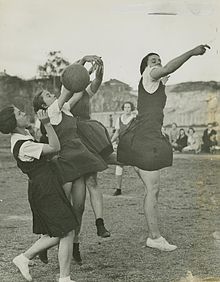 immigrant to the USA, James Naismith, was ordered to invent an indoor game for high-spirited young men at the School for Christian Workers (later the YMCA).
immigrant to the USA, James Naismith, was ordered to invent an indoor game for high-spirited young men at the School for Christian Workers (later the YMCA).
Most games tried ended with injury rates of staggering proportions! So Naismith conjured up a game whereby a ball had to be lobbed into a high peach basket (his reasoning being that if a ball had to dropped into the “goal”, it couldn’t be thrown at breakneck speed).
Basketball was born, with the original game featuring nine players – three forwards, three centres and three guards – simply because Naismith had 18 youths to keep amused.
Women’s indoor basketball began exactly two days later when female teachers to the gym were captivated by the game but it wasn’t until 1895 that the current game of netball was well and truly shaped. When Clara Baer, a sports teacher in New Orleans, wrote to Naismith asking for a copy of the rules, the subsequent rules package contained a drawing of the court with lines penciled across it, simply to show the areas various players could best patrol. But Baer misinterpreted the lines and thought players couldn’t leave those areas! In 1899 her mistake was ratified into the rules of women’s basketball as zones.
Three-bounce dribbling had quickly been extended in the men’s game (which didn’t have no-go zones), but it was seldom used in the women’s version when it reached Britain and the Empire. In fact, there was no pressure to increase that form of ball movement and in the end dribbling simply ceased to exist.
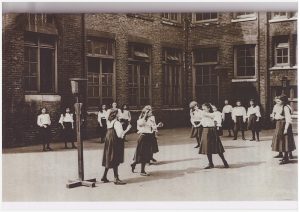 Netball was first played in England in 1895 at Madame Ostenburg’s College. In the first half of the 20th century, Netball’s popularity continued to grow, with the game being played in many British Commonwealth countries. There were no standard rules at that time with both nine-a-side and five-a-side versions of the game.
Netball was first played in England in 1895 at Madame Ostenburg’s College. In the first half of the 20th century, Netball’s popularity continued to grow, with the game being played in many British Commonwealth countries. There were no standard rules at that time with both nine-a-side and five-a-side versions of the game.
During an Australian tour of England in 1957, discussions took place concerning standardising the rules of the sport and this led to representatives from England, Australia, New Zealand, South Africa and The West Indies meeting in Sri Lanka in 1960, to establish The International Federation of Women’s Basketball and Netball. Formal rules were established at this inaugural meeting and it was decided to hold World Championship tournaments every four years, beginning in Eastbourne, England, in 1963.
Since then World Championships have been held in Australia 1967, Jamaica 1971, New Zealand 1975, Trinidad & Tobago 1979, Singapore 1983, Scotland 1987, Australia 1991, England 1995 and New Zealand 1999. Throughout this period, Australia has dominated, winning the event in 1971, 1975, 1979, 1983, 1991, 1995 and 1999. The 2003 World Netball Championships in Kingston, Jamaica saw New Zealand finally breaking the Australian dominance taking Gold. The 2007 World Netball Championships was due to take place in Fiji but a political coup in the country led to the event being transferred to Auckland, New Zealand. Despite the home advantage, New Zealand were unable to defend their crown and Australia were once more World Champions. Australia retained their title in 2011 in Singapore and in 2015 in Sydney.
As part of the Australian Bicentenary Celebrations in 1988, a Youth Tournament took place in Canberra, for players aged under 21. Its success led to this event being held once every four years. Fiji hosted the 2nd World Youth Netball Championship, Canada the 3rd and the 4th has just taken place in Wales. Australia were winners in 1988, New Zealand in 1992 and Australia again in 1996 and 2000. At the 2005 World Youth Netball Championship, held in Florida New Zealand Won Gold, England Silver and Australia took the Bronze.
In 1995 Netball became a “recognized” sport of the 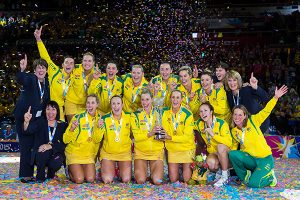 International Olympic Committee (IOC) and one of the Federation’s objectives is to ensure this status is retained and to encourage the International Olympic Committee to include Netball in the Olympic Games Programme in the future.
International Olympic Committee (IOC) and one of the Federation’s objectives is to ensure this status is retained and to encourage the International Olympic Committee to include Netball in the Olympic Games Programme in the future.
Netball was included in the Commonwealth Games programme, for the first time, in 1998 in Kuala Lumpur, where Australia took the Gold medal, New Zealand Silver and England the Bronze. It was also a programmed sport in 2002 Commonwealth Games in Manchester (England), where Australia again took the Gold medal, New Zealand Silver and Jamaica edging out England for the Bronze. In 2006 (Melbourne, Australia) and 2010 (Delhi, India) New Zealand beat Australia and England won the bronze medal. Netball is now a core sport in the Commonwealth Games, with the next editions taking place in The Gold Coast, 2018.
2008 saw the launch of Fast Net World Netball Series, a shorter, sharper version of the game which in 2012 evolved into Fast5, attracting new audiences around the globe.
2012 also saw the sports governing body unveil a new logo and renamed itself as the International Netball Federation (INF). We hope that you will join us on Netball’s journey to the future.
World Netball History
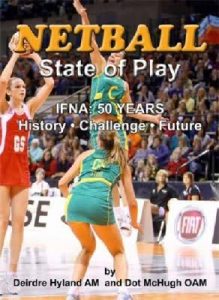 As the sport has evolved so has the international governing body as the International Federation of Netball Associations (IFNA), now named World Netball, has also moved with the times in what is an ever changing and challenging global environment
As the sport has evolved so has the international governing body as the International Federation of Netball Associations (IFNA), now named World Netball, has also moved with the times in what is an ever changing and challenging global environment
At Congress 2011 Australian netball stalwarts Deidre Hyland AM and Dorothy (Dot) McHugh OAM launched their book, ‘Netball – State of Play’, a history of the first 50 years of the International Federation of Netball Associations to coincide with IFNA’s Golden Jubilee.
Based primarily on documentary evidence, the book traces the early development of the Federation, the evolution of the international game, and the development of the sport of netball beyond the Commonwealth.
One of the most interesting sections of the book contains the reflections of a number of significant people, including Marva Bernard OD from Jamaica, Anne Taylor OBE (New Zealand), and Baroness Sue Campbell CBE (England), on where they see the Federation heading in the next 50 years.
Netball – State of Play has been a labour of love for Deidre and Dot, who claim that their greatest reward is the number of wonderful friends they have made through netball, not only in Australia but around the world.
“This book is our way of expressing appreciation to the 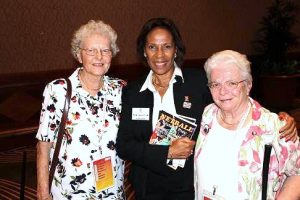 International Federation for
International Federation for
the many opportunities and memorable experiences we have enjoyed as a result of our involvement with the sport of netball,” Deidre said. INF President Molly Rhone OJ, CD said the book was an invaluable record of the many stages of the game.
“I congratulate Deidre and Dot, both netball icons in their own right, who have devoted much of their lives to the development of the sport and have now placed on record the progress of the Federation since its inception.”
Both Dot and Deidre have had their contribution to sport, and netball, in particular, recognisesd by the Australian Government and by various netball Associations.
They both hold Netball Australia and IFNA Service Awards and both have been inducted into the Australian Netball Hall of Fame.





